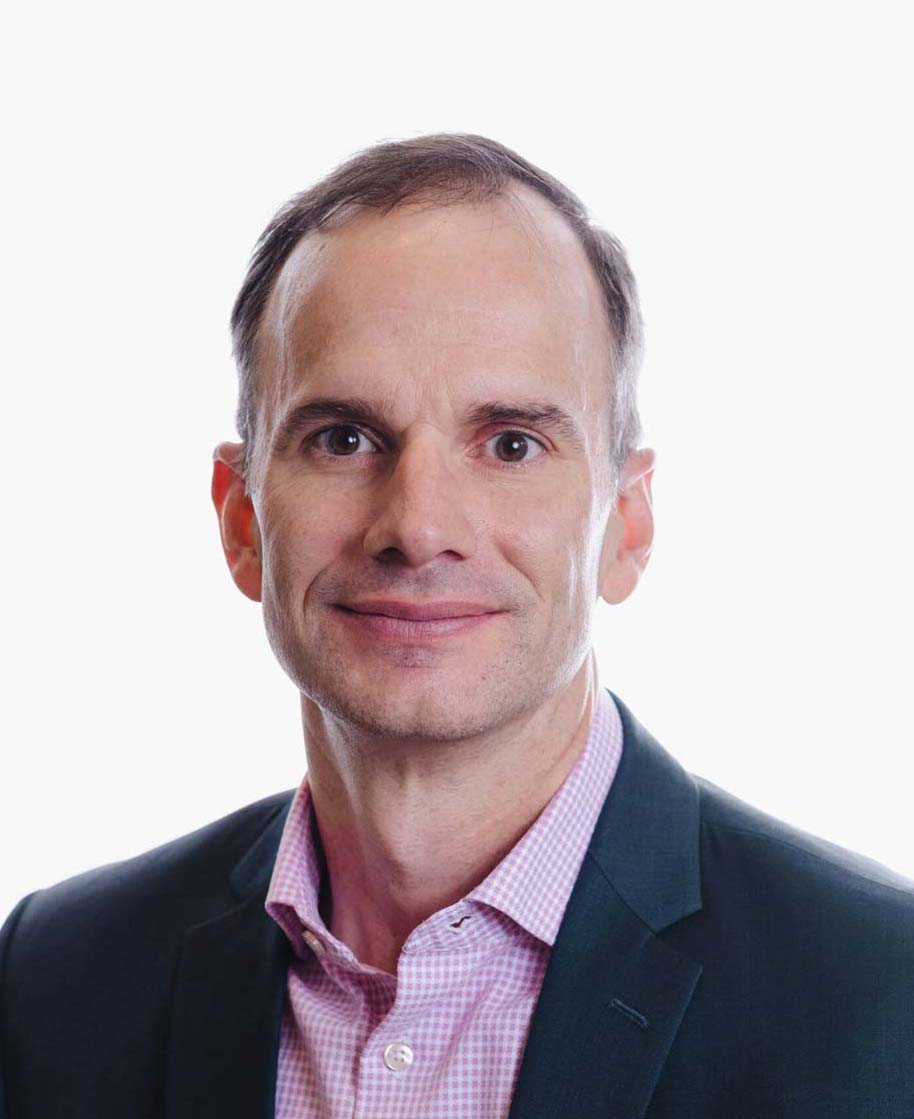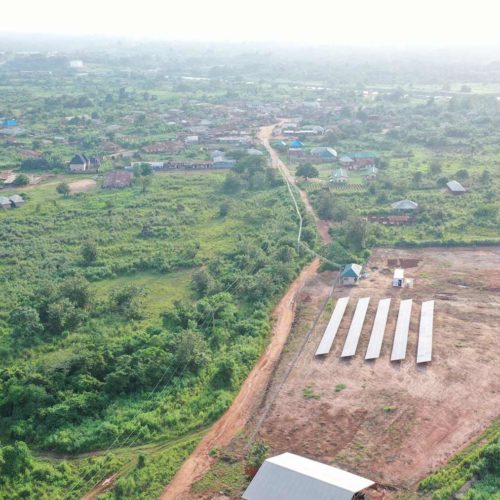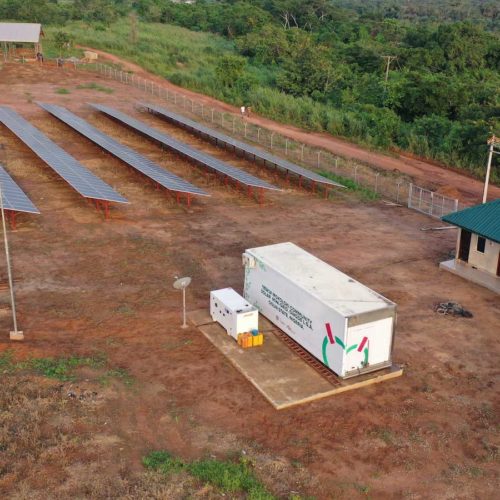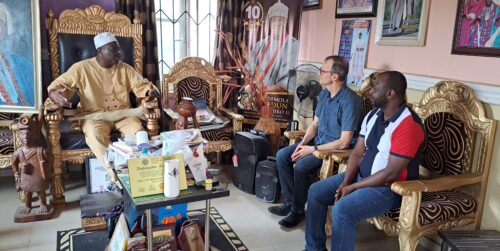
Dispatch from Nigeria
On a visit to Africa’s biggest economy, RMI’s Jon Creyts finds rising demand for solar solutions
The king was grilling me.
King Oba Ademola J.E. Ogunbona of Mokoloki was frustrated that his town’s solar minigrid could no longer sustain power through the night.
Let me back up. Three years ago, RMI worked with local private developer Nayo Tropical Technologies Limited to install a 185-kilowatt solar minigrid with battery storage, in collaboration with Ibadan Electricity Distribution Company (IBEDC) in the town of Mokoloki, a short drive north of Lagos, Nigeria’s sprawling commercial capital. Across the region, ancestral kingdoms predate modern political borders and kings continue to hold authority as community leaders.
With the installation of the minigrid in 2020, the town of 200 went from having at most three hours of power every day to being able to keep the lights on through the night. Suddenly, kids were reading and studying past sunset, storefronts stayed open, and other work could go on into the evening. The minigrid also powers water purification, a bakery, and a hotel.
For the community, this was a transformational development. Mokoloki grew to around 350, as newcomers relocated, drawn by the benefits of the minigrid.
In January, I was visiting Mokoloki with Suleiman Babamanu, our program director in Nigeria who joined RMI last year. With more than 14 years of experience developing strategies for clean energy infrastructure in Africa, Suleiman is leading a growing team focused on expanding RMI’s impact across Nigeria. Joining us was Raul Alfaro-Pelico, RMI’s senior director for the Africa Energy Program and Energy Transition Academy, or ETA — below, more on Raul’s work to expand the ETA model to Africa.
That day, the king wasn’t the only advocate for reliable power we encountered. For example, one local shop owner explained that she started off with one icebox in her store to sell ice, sodas, water, and other chilled offerings. With steadier power, she was able to multiply that first fridge into five. But with power no longer lasting through the night, she risks losing produce and goods to spoilage.
Access to reliable electricity also helped Daniel, a metal worker, set up an arc welder — a metal working tool that uses electricity to fuse steel. The new tool let him begin assembling and repairing agricultural equipment, boosting business and helping local farmers. Not far from Daniel’s shop, a developer built a complex outfitted with 17 air conditioners — still a luxury in a region where summer can bring humid days and temperatures that spike to over 100°F.
With the benefits of reliable power drawing more residents, it wasn’t long before the original 185-kilowatt minigrid was feeding and supporting a community that had nearly doubled in size. In time, the solar system couldn’t keep up.
That’s why, a few weeks ago, I found myself seated next to Mokoloki’s king who was quizzing me about why local kids could no longer read at night because the lights were flickering out at 8 p.m.
But don’t worry, it ended well.
The original project was made possible with cooperation between key stakeholders, including IBEDC and Nayo Tropical Technologies, and supported by RMI and the Nigerian Rural Electrification Agency.
Drawing on this experience, and with support via RMI’s Sharing the Power project, we’re helping Mokoloki to expand its minigrid and power the town’s growing appetite for clean energy.
Sustainable Solutions for a Fast-Growing Market
This is just one story from my inspiring trip to Nigeria. With 218 million people, Nigeria is both Africa’s most populous nation and the continent’s biggest economy — so a natural hotspot for innovation in scaling clean, affordable energy. RMI is on the frontlines there, working alongside communities, developers, the government, and local partners, listening to their needs, and offering clean energy solutions. And as our success there has grown, Nigeria is emerging as the hub of RMI’s wider work across the region.
While traveling with the team, I also had the privilege of meeting Nigerian Vice President Yemi Osinbajo. In Abuja — Nigeria’s fast-growing administrative capital and home to almost four million people — we spoke about his country’s energy transition plan. I reinforced RMI’s commitment to help Nigeria reach its goal to get to net-zero by 2060, sharing success stories of our work in China, India, and Indonesia.
While in Abuja, I also had lunch with a dozen or so developers. These pioneers, focused mostly on building solar-powered minigrids across this sun-soaked country, all pointed to a real need for greater expertise inside the distribution companies — the companies whose wires send power to end-users — to better understand exactly what solar developers need to really scale up solar energy. I saw firsthand that RMI was addressing a real need, helping build the capacity inside these grid companies that is so critical, so that the developers who have the solutions can plug them — quite literally and more easily — into the grid.
Multiplying a Successful Formula
Back on the coast in Lagos — with more than 20 million residents, one of the world’s biggest and fastest-growing megacities — I witnessed our partnership with the Lagos Energy Academy. RMI hosted 25 fellows from four of Nigeria’s largest distribution companies — whose wires relay power from generators to customers. This group is learning about renewables and distributed generation models, and how to incorporate both into their systems.
To be sure, RMI has no intention of marching through every country around the world, building transition plans and helping every group of developers or every utility in every market. Indeed, we recognize that every community needs to choose the energy pathway that makes the most sense for them and that we need to find ways to scale the ideas that work.
Rather we see capacity building is a critical way to scale this growth. At the same time, we have learned that in the past, much of the investment in global capacity building has failed to produce results, especially when the community is not at the center of the design process.
RMI is making progress where others have struggled. In the Caribbean, RMI has seen success with a formula that scales renewables by building capacity and. The ETA model — developed with input from Global South energy leaders — expands an economy’s capacity to develop and provides peer networking opportunities for leaders in the power sector in ways that respond directly to local priorities.
The ETA approach also fosters links between the demand side, with distribution companies, and the supply side, with developers and utilities. Helping those pieces fit together better can create clean energy deals that are better for all.
Building on those learnings and successes across the Caribbean, Raul and team are translating the model to accelerate the clean energy transition in Africa. And I’m thrilled to see that the work is expanding. Today, RMI’s Africa program extends beyond Nigeria, with projects and partners taking root in Ethiopia, Malawi, Rwanda, and Uganda.
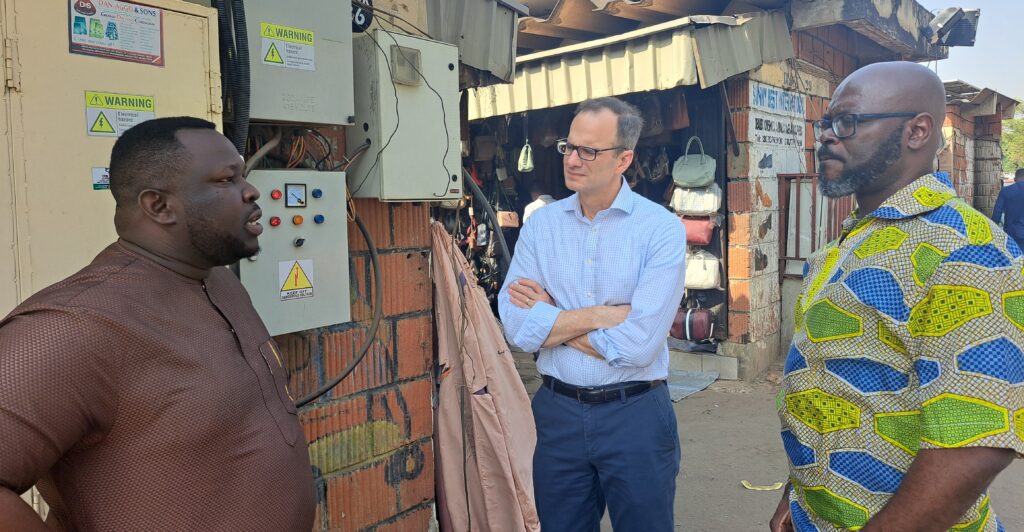
Ifeanyi Orajaka (left), CEO of renewable energy developer Green Village Electricity (GVE) Projects Ltd. who partnered with RMI to build the solar minigrid at Abuja’s Wuse Market, talks about the project with RMI’s chief executive Jon Creyts and Raul Alfaro-Pelico, senior director of RMI’s Africa Energy Program and the Energy Transition Academy.
Replacing Smoky Generators with Resilient Solar
Back on the ground in Nigeria, one of the most inspirational moments of my trip was when Suleiman took us to a huge market in the center of Abuja. With 2,000 open-air stalls, where merchants sell a huge variety of wares, Abuja’s Wuse market is the heart of the local community.
Yet the market regularly goes dark. During the day, there is no power because the fast-growing load has overwhelmed conventional supplies.
Solar minigrids offer a transformative solution. Starting in 2019, RMI led a pilot project to install a solar minigrid serving part of the Abuja market in partnership with the Global Energy Alliance for People and Planet (GEAPP) and including Nigeria’s Rural Electrification Agency, Green Village Electricity (GVE) Projects Ltd., Abuja Electricity Distribution Co., and Abuja Markets.
Today, about 80 of the market’s 2,000-plus stalls are connected to this minigrid. More would like to be, as evidenced by the service disruptions I saw — and heard and smelled.
While visiting on a weekday morning, the power went off across the market around 10:30. Suddenly, merchants in every direction rolled out and fired up portable diesel and gas generators. Each one was pulled as far as possible from their stalls, linked by long extension cords. As dozens of these motors revved up, the noise grew deafening, and the oily smell of exhaust filled the air.
But in the area with the 80 stalls connected to the solar minigrid, the lights stayed on, the fridges still hummed — all with no smoke or noise.
With all the substantial power load I was seeing, I was little concerned we might witness the failure of the solar minigrid. And one of the solar connected merchants even rolled out a generator, perhaps sharing the same concern.
But both of us were proven wrong. That generator wasn’t necessary. The solar power kept delivering.
To me, this was “applied hope” in real time: A vendor, a market, and a growing number of people experiencing first hand that the transition to clean energy is not only real and reliable, but also simply better.
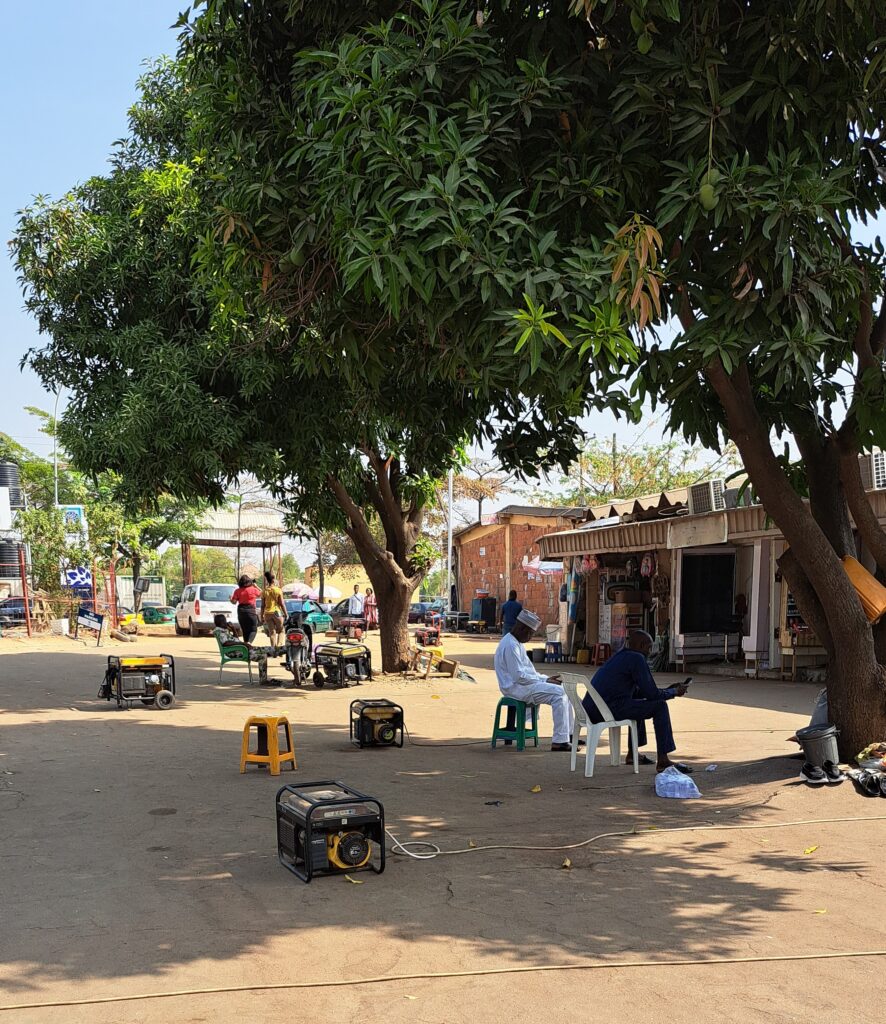
When grid power fails at Abuja’s Wuse Market, most shops fire up fossil-fueled generators, spiking noise levels and air pollution.
For more on RMI’s work in Nigeria and related projects, see:
- Story: Boosting Community Resilience by Building Nigeria’s First Solar- and Battery-Powered Undergrid Minigrid (July 2020)
- Project Update: Mokoloki’s Minigrid, Two Years In (February 2022, PDF)
- News: RMI Launches the Energizing Agriculture Program (March 2022)
- News: RMI Hires Global Leaders to Accelerate the Transition to Sustainable Energy in the Global South (April 2022)
- Page: RMI’s Energy Transition Academy
- Page: RMI’s Africa Energy Program
- Page: RMI’s Sharing the Power Program: Community-Led Minigrids
